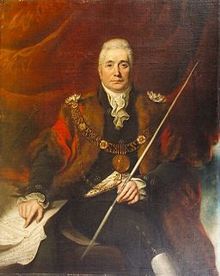John Claudius Beresford
| John Claudius Beresford | |
|---|---|

Portrait by William Cumming
|
|
| Lord Mayor of Dublin | |
|
In office 1814–1815 |
|
| Preceded by | John Cash |
| Succeeded by | Robert Shaw |
| Member of Parliament for County Waterford | |
|
In office 6 January 1806 – June 1811 |
|
| Member of Parliament for Dublin City Irish Parliament (1798–1801) |
|
|
In office 1798–1804 |
|
| Member of Parliament for Swords | |
|
In office 1790–1798 |
|
| Personal details | |
| Born | 23 October 1766 |
| Died | 20 July 1846 (aged 79) |
| Political party | Tory |
| Spouse(s) | Elizabeth McKenzie Menzies |
| Children | 5 |
| Alma mater | Trinity College, Dublin |
| Military service | |
| Allegiance |
|
| Service/branch | Yeomanry |
| Battles/wars | Irish Rebellion of 1798 |
John Claudius Beresford (23 October 1766 – 20 July 1846) was a Tory UK Member of Parliament representing Dublin City 1801–1804 and County Waterford 1806–1811.
From 1783, Beresford served as a storekeeper for the port of Dublin. He was subsequently appointed to a wealthy sinecure post of Inspector-General of Exports and Imports. He was returned by his father, Hon. John Beresford, for the family borough of Swords to the Irish House of Commons in 1790. In 1798 he was returned for Dublin City, helped by his position in the port, and as a partner in a leading Dublin bank and a member of Dublin Corporation.
During the United Irishman rebellion of 1798, Beresford led a yeoman battalion which fought against the rebels with a particular ferocity. He kept a riding school in Dublin, which acquired an evil reputation as the chief scene of the floggings by which evidence was extorted from the United Irishmen. As such, he became identified as one of the leading opponents of the rebellion, and the rebels deliberately burnt the banknotes issued by his bank. His reputation for persecuting political opponents survived throughout his political career.
He took a prominent part in the Irish House of Commons, where he unsuccessfully moved the reduction of the proposed Irish contribution to the imperial exchequer in the debates on the Act of Union. He was to the last an ardent opponent of the union (taking the opposite position to his father); he resigned his post at the port on 25 January 1799 so as not to be tainted by it or by the suggestion that his actions were motivated by a desire to retain it.
Under a provision of the Act of Union 1800 he retained his seat in the 1st Parliament of the United Kingdom 1801–02 without a fresh election, and in the Union Parliament he was a supporter of William Pitt the younger and later Henry Addington; he had to give up his Irish business interests to play a full part in Parliamentary business. He was re-elected at the general election of 1802, being top of the poll.
...
Wikipedia
